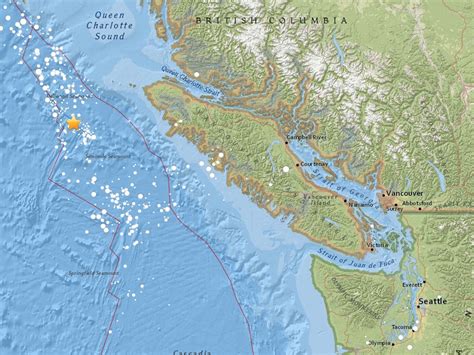5.1 Earthquake Strikes Vancouver Island: A Comprehensive Guide to Preparedness and Response
The recent 5.1 magnitude earthquake that struck Vancouver Island serves as a stark reminder of the seismic activity prevalent in the region. While no significant damage was reported this time, it highlights the crucial need for preparedness. This comprehensive guide will equip you with the knowledge and resources to stay safe before, during, and after an earthquake.
Understanding the Risk
Vancouver Island sits on the Cascadia Subduction Zone, a major fault line capable of producing extremely powerful earthquakes. Understanding the potential risks is the first step towards effective preparedness. Familiarize yourself with the different types of seismic events and their potential impacts, including:
- Ground shaking: The intensity of shaking depends on the earthquake's magnitude, distance from the epicenter, and local soil conditions.
- Tsunamis: Major earthquakes along the Cascadia Subduction Zone can generate tsunamis, posing a significant threat to coastal communities.
- Liquefaction: Soft, saturated soils can lose their strength during an earthquake, causing buildings to collapse or tilt.
- Landslides: Earthquakes can trigger landslides, especially in mountainous areas.
Before the Earthquake: Proactive Measures
Preparation is key to minimizing the impact of an earthquake. Here's what you can do before the ground starts shaking:
- Create an emergency plan: This plan should include evacuation routes, meeting points, and communication strategies. Ensure your family understands the plan. Involve children in the process to make it more engaging and memorable.
- Secure your home: Identify potential hazards and take steps to secure them. This includes anchoring heavy objects to walls, securing bookcases, and bracing water heaters.
- Stock an emergency kit: This kit should contain essential supplies such as water, food, first-aid supplies, medications, a flashlight, a battery-powered radio, and extra batteries. Aim for a minimum of 72 hours worth of supplies.
- Learn CPR and first aid: This essential skill can save lives in the aftermath of a disaster.
- Know your surroundings: Familiarize yourself with the location of emergency exits and assembly points in your home, workplace, and school.
During the Earthquake: Staying Safe
When the shaking starts, remember these critical steps:
- Drop, cover, and hold on: This is the most effective way to protect yourself from falling debris. Get under a sturdy table or desk and hold on until the shaking stops.
- Stay away from windows and exterior walls: These are more likely to be damaged during an earthquake.
- If you're outdoors, find a clear spot away from buildings, power lines, and trees.
- If you're driving, pull over to a safe location and stay in your vehicle until the shaking stops.
After the Earthquake: Recovery and Response
Following an earthquake, your actions can significantly impact your safety and the safety of others.
- Check for injuries and provide first aid if needed.
- Check your home for damage and report any significant problems to the authorities.
- Listen to the radio or TV for updates and instructions from emergency officials.
- Be aware of aftershocks, which can be as strong as the initial earthquake.
- Do not enter damaged buildings.
- Conserve water and food, as supplies may be limited.
Building a Resilient Community
Preparing for earthquakes is not just an individual responsibility; it's a community effort. By working together, we can build a more resilient community that is better prepared to cope with the challenges of seismic activity. Participate in community preparedness programs, share your knowledge with friends and neighbors, and support local emergency response efforts.
By implementing these strategies, you significantly improve your chances of surviving and recovering from an earthquake on Vancouver Island or anywhere else prone to seismic activity. Remember, preparation is not just about surviving; it's about thriving in the aftermath. Be prepared. Be safe.
